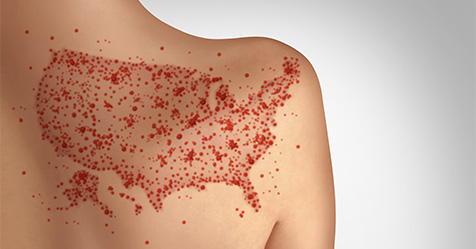COVID-19 Wreaks Havoc With Health Care-Acquired Infections
Study finds instances of MRSA and other infections have increased since the pandemic
Health care facilities’ focus on the prevention of COVID-19 has likely lead to an increase in other health care-associated infections, according to a study published in Infection Control & Hospital Epidemiology.
Researchers from the U.S. Centers for Disease Control and Prevention (CDC) calculated national- and state-level standardized infection ratios (SIRs) for each quarter in 2020 and compared these SIRs with 2019. They looked at data for several HAIs including central-line-associated bloodstream infections (CLABSIs), catheter-associated urinary tract infections (CAUTIs), ventilator-associated events (VAEs), select surgical site infections, Clostridioides difficile (C. diff), and methicillin-resistant Staphylococcus aureus (MRSA).
The CDC investigators found significant increases in the national SIRs for MRSA, CLABSI, CAUTI, and VAE.
“Several factors likely contributed to the increases in several categories of HAI, among them, the fact that hospital leadership and staff were laser-focused on the pandemic,” write the authors of an accompanying editorial. “As a discipline, we need to develop strategies that can be effective in maintaining the highest possible quality of infection prevention and control activities while still supporting a pandemic response.”
Meanwhile, COVID-19 has also been a factor in the upswing of cases of another HAI—Candida auris (C. auris). The infection has a mortality rate of 30% to 60% and attacks patients with weakened immune systems, notably those suffering from COVID-19.
A relatively new HAI, C. auris has been diagnosed in 40 countries since the first report about it in 2009, involving a 70-year-old patient at a Tokyo hospital. By 2016, 13 cases had been identified in the United States, leading the CDC to issue interim recommendations and request that laboratories report cases and send samples to state and local health departments.
Although C. auris is often multidrug-resistant, scientists report good news in that a new drug therapy may be effective in treating the condition, Infection Control Today reports. Researchers at St. Jude Research Hospital in Chicago are studying new antifungal agents as treatment for the infection. These agents show promise against the infection, but they need to undergo more clinical trials for researchers to better understand their full treatment utility.


